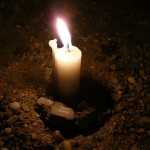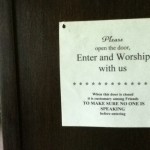Spiritual Identity and Membership Series:
Part 1: Quakerpagan or Paganquaker –
Part 2: Membership and Identity –
Part 3: Marshall Massey Replies
The following is a reply by Marshall Massey of Earth Witness Journal to my post about Membership and Identity. I think it raises points that are important enough to both Quakers and Pagans that I want to feature it in a post of its own rather than have it tucked away as an appended comment.
Marshall’s reply:
———————
Friends Peter and Cat, you don’t have to publish this comment on your site if you don’t want to; you can read it and then delete it, and that’s fine with me. I’m not sure what I am about to say is better discussed on an open forum than in private e-mail.
But since I am mentioned in the opening paragraph of this post, I believe I have a bit of a duty to respond.
The truth may be either that there are many things we call “divine”, or that the divine has many faces. Different paths take one to different “divines”, or to different faces of the one “divine”. The path of the Berserkers of Norway, who worked themselves into a murderous superhuman excitation that they regarded as possession by the divine, took them to a very different “divine”, or a very different face of the divine, from the path of Francis of Assisi or the path of George Fox.
Traditional Quakerism takes its practitioners to a specific face of the divine that is (in my personal opinion) either identical or virtually identical to the face that the historic Jesus Christ showed his followers. But (still just speaking personally) I do not believe that the face of the divine experienced by modern Pagans who “draw down the God” is the same face or even anything near the same face. I do not deny that there is something one may validly call “divine” about it, but I do not, personally, believe that what is divine in it is what Christ wanted us to practice and approach.
A community that defines itself by relationship to the divine, without looking carefully at what it means by that word, is, in my personal opinion, a community that is quite capable of going profoundly wrong. I think it was this sort of inattention to changing understandings of the divine that led the humble, meek early Christian religion to evolve over the course of a thousand years into something that hosted the Inquisition and the Crusades.
So I view the visible lack of concern for changing understandings of the divine, that many liberal Quaker meetings display in accepting a very, very wide range of applicants as members, with great dismay.
I’m not saying that I expect liberal meetings to sponsor a Crusade or an Inquisition tomorrow or next year; but I certainly see the seeds of hatred in their reaction to FUM’s personnel policy, and in their usual attitude toward Republicans. I’m not saying that FUM and Republicans are pure and virtuous; but for someone genuinely on a Christian path, the effort is always to remove the board from one’s own eye before removing the mote from one’s neighbor’s. And I don’t see that happening in meetings (or churches, either) where people say, “My truth is different from your truth; my way of understanding the divine, my way of approaching the divine, is different from yours, different from Friends’ traditional way; and I’m going to be a member of your Society but I’m hanging on to mine.”
The gentle Christ who taught a non-resistant path to overcoming evil, is not Herne, the god of the hunt. The path of saying to God, “if it’s all the same to You, I’d rather not drink this cup, but nevertheless, not my will but Thine,” is a different path from that of “drawing down” divine energies. It just might be that what you experienced, Peter, when you stood and spoke in meeting for worship for the first time — even though it was an experience of the divine — nevertheless was not anything like what traditional Quakerism is actually about.
———————
Peter again:
When we asked Marshall if we could publish his reply in a post, he expressed some concern that “because it was such a direct challenge to the theory underlying modern liberal-pluralist Quakerism, that I thought it might offend or upset you or others.” Quite the opposite, at least in my case. Plain speaking among Friends is as important as corporate worship as we labor together towards discernment. But beyond that, the questions Marshall raises about what exactly is going on in worship or in drawing down (two very distinct practices, as he points out) are of bedrock importance to anyone who practices any kind of ecstatic communion with the Divine.
It will take some time for me to respond. I write with great deliberation at the best of times, and I’m coming now into the final six weeks of a difficult year of teaching. Further, the questions here are profound and I want to sit with them and let my thoughts season a bit before giving them voice.
Thank you, Marshall, for the faithfulness of your reply. May I do as well.











